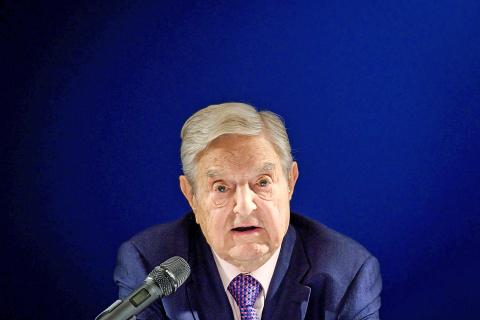US investor George Soros said there was a “mortal danger” of China’s use of artificial intelligence (AI) to repress its citizens under the leadership of Chinese President Xi Jinping (習近平), whom he called the most dangerous opponent of democracies.
“The instruments of control developed by artificial intelligence give an inherent advantage of totalitarian regimes over open societies,” the 88-year-old said on Thursday at the World Economic Forum in Davos, Switzerland. “China is not the only authoritarian regime in the world, but it’s undoubtedly the wealthiest, strongest and most developed in machine learning and artificial intelligence.”
The former hedge fund manager said that Beijing is developing a centralized database that would use algorithms to determine whether a person poses a threat to China’s one-party system.

Photo: AFP
While China’s so-called social credit system is not yet fully operational, “it will subordinate the fate of the individual to the interests of the one-party state in ways unprecedented in history,” Soros said.
“I find the social credit system frightening and abhorrent,” he said.
Soros drew a distinction between Xi and Chinese, saying the latter remain a main source of hope.
At the Davos conference last year, Soros criticized social-media giants Facebook Inc and Google. He compared them to gambling companies that foster addiction among users and said that they exploit the data they control.
Soros on Thursday reiterated the need to regulate technology firms while authoritarian regimes declare theirs as “national champions.”
“That’s what has enabled some Chinese state-owned companies to catch up with and even surpass the multinational giants,” he said.
In his speech, Soros touched on subjects including his childhood, running a hedge fund and his efforts to protect human rights.
He spoke at length about China, criticizing Xi and the nation’s Belt and Road Initiative infrastructure project as self-serving.
He also called Russian President Vladimir Putin another enemy of democracy.
“I’ve been concentrating on China, but open societies have many more enemies, Putin’s Russia foremost among them,” Soros said.

Greek tourism student Katerina quit within a month of starting work at a five-star hotel in Halkidiki, one of the country’s top destinations, because she said conditions were so dire. Beyond the bad pay, the 22-year-old said that her working and living conditions were “miserable and unacceptable.” Millions holiday in Greece every year, but its vital tourism industry is finding it harder and harder to recruit Greeks to look after them. “I was asked to work in any department of the hotel where there was a need, from service to cleaning,” said Katerina, a tourism and marketing student, who would

i Gasoline and diesel prices at fuel stations are this week to rise NT$0.1 per liter, as tensions in the Middle East pushed crude oil prices higher last week, CPC Corp, Taiwan (台灣中油) and Formosa Petrochemical Corp (台塑石化) said yesterday. International crude oil prices last week rose for the third consecutive week due to an escalating conflict between Israel and Iran, as the market is concerned that the situation in the Middle East might affect crude oil supply, CPC and Formosa said in separate statements. Front-month Brent crude oil futures — the international oil benchmark — rose 3.75 percent to settle at US$77.01

Merida Industry Co (美利達) has seen signs of recovery in the US and European markets this year, as customers are gradually depleting their inventories, the bicycle maker told shareholders yesterday. Given robust growth in new orders at its Taiwanese factory, coupled with its subsidiaries’ improving performance, Merida said it remains confident about the bicycle market’s prospects and expects steady growth in its core business this year. CAUTION ON CHINA However, the company must handle the Chinese market with great caution, as sales of road bikes there have declined significantly, affecting its revenue and profitability, Merida said in a statement, adding that it would

UNCERTAINTIES: The world’s biggest chip packager and tester is closely monitoring the US’ tariff policy before making any capacity adjustments, a company official said ASE Technology Holding Inc (日月光投控), the world’s biggest chip packager and tester, yesterday said it is cautiously evaluating new advanced packaging capacity expansion in the US in response to customers’ requests amid uncertainties about the US’ tariff policy. Compared with its semiconductor peers, ASE has been relatively prudent about building new capacity in the US. However, the company is adjusting its global manufacturing footprint expansion after US President Donald Trump announced “reciprocal” tariffs in April, and new import duties targeting semiconductors and other items that are vital to national security. ASE subsidiary Siliconware Precision Industries Co (SPIL, 矽品精密) is participating in Nvidia